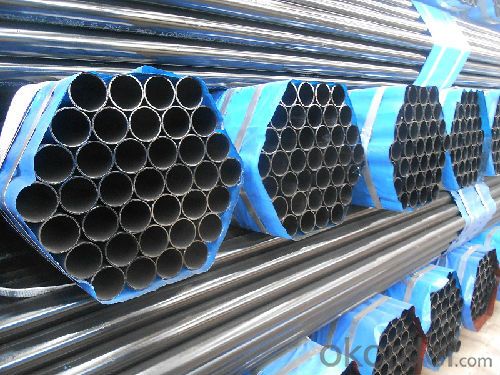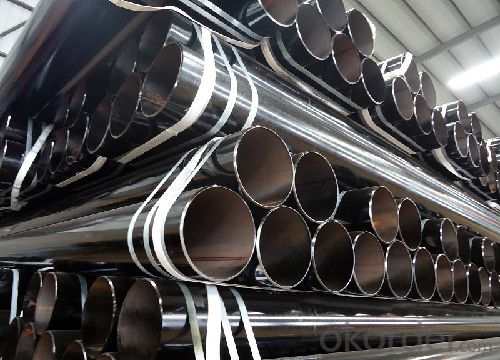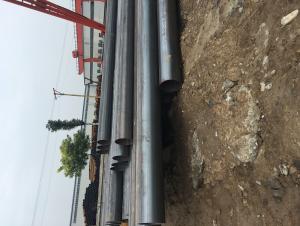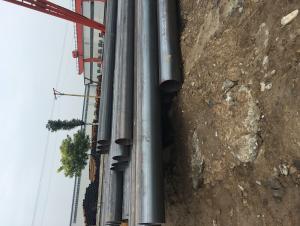Alloy structural steel seamless steel pipe
- Loading Port:
- Tianjin
- Payment Terms:
- TT or LC
- Min Order Qty:
- 25 m.t.
- Supply Capability:
- 1000 m.t./month
OKorder Service Pledge
OKorder Financial Service
You Might Also Like
1、Structure of Alloy structural steel seamless steel pipe :
Seamless pipe is formed by drawing a solid billet over a piercing rod to create the hollow shell. As the manufacturing process does not include any welding, seamless pipes are perceived to be stronger and more reliable. Historically seamless pipe was regarded as withstanding pressure better than other types, and was often more easily available than welded pipe.
2、Main Features of Alloy structural steel seamless steel pipe :
• High manufacturing accuracy
• High strength
• Small inertia resistance
• Strong heat dissipation ability
• Good visual effect
• Reasonable price
3、 Alloy structural steel seamless steel pipe Specification:
Standard | GB, DIN, ASTM ASTM A106-2006, ASTM A53-2007 |
Grade | 10#-45#, 16Mn 10#, 20#, 45#, 16Mn |
Thickness | 8 - 33 mm |
Section Shape | Round |
Outer Diameter | 133 - 219 mm |
Place of Origin | Shandong, China (Mainland) |
Secondary Or Not | Non-secondary |
Application | Hydraulic Pipe |
Technique | Cold Drawn |
Certification | API |
Surface Treatment | factory state or painted black |
Special Pipe | API Pipe |
Alloy Or Not | Non-alloy |
Length | 5-12M |
Outer Diameter | 21.3-610mm |
Grade | 20#, 45#, Q345, API J55, API K55, API L80, API N80, API P110, A53B |
Standard | ASME, ASTM |
1) Material:20#(ASTM A 106/A53 GRB.API5LGRB,GB),45#,16Mn,10#.
2) Specification range:OD:21.3-610mm,WT:6-70mm,length:6-12m or according to the requirement of clients.
3) Excutive standards:GB,ASME API5L.ASTM A 106/A53,Despite of the above standards,we can also supply seamless steel pipe with standard of DIN,JIS,and so on,and also develop new products according to the requirements of our clients!
4) Surface:black lacquered,varnish coating or galvanized.
5) Ends:Beveled or square cut,plastic capped,painted.
6) Packing:bundles wrapped with strong steel strip,seaworthy packing.
4、Packaging & Delivery
Packaging Details: | seaworthy package,bundles wrapped with strong steel strip |
Delivery Detail: | 15-30days after received 30%TT |
5、FAQ of Alloy structural steel seamless steel pipe
①How is the quality of your products?
Our products are manufactured strictly according to national and internaional standard, and we take a test
on every pipe before delivered out. If you want see our quality certifications and all kinds of testing report, please just ask us for it.
Guaranteed: If products’ quality don’t accord to discription as we give or the promise before you place order, we promise 100% refund.
②How about price?
Yes, we are factory and be able to give you lowest price below market one, and we have a policy that “ for saving time and absolutely honest business attitude, we quote as lowest as possible for any customer, and discount can be given according to quantity”,if you like bargain and factory price is not low enough as you think, just don’t waste your time.Please trust the quotation we would give you, it is professional one.
③Why should you chose us?
Chose happens because of quality, then price, We can give you both.Additionally, we can also offer professional products inquiry, products knowledge train(for agents), smooth goods delivery, exellent customer solution proposals.Our service formula: good quality+good price+good service=customer’s trust
SGS test is available, customer inspection before shipping is welcome, third party inspection is no problem.
6、 Alloy structural steel seamless steel pipe Images:


- Q:How are steel pipes made?
- Steel pipes are made through a process called pipe manufacturing, which involves multiple steps. Firstly, raw steel is melted in a furnace and then subjected to continuous casting to form a solid billet. This billet is then heated and pierced to create a hollow tube called a shell. Next, the shell is rolled and stretched to the desired diameter and thickness using a series of rollers. The pipe is then subjected to a process called welding, where two edges of the shell are fused together to create a seamless or welded pipe. Finally, the pipe undergoes various finishing processes such as cutting, straightening, and inspection before being ready for use.
- Q:How are steel pipes coated to prevent internal corrosion?
- Steel pipes are coated to prevent internal corrosion through a process called internal coating. This involves applying a layer of protective material, such as epoxy or polyethylene, to the inner surface of the pipe. The coating acts as a barrier, preventing the steel from coming into contact with corrosive substances in the fluid being transported, thus effectively reducing the risk of internal corrosion.
- Q:How are steel pipes protected against microbial corrosion?
- Various methods are employed to safeguard steel pipes against microbial corrosion. One widely used technique entails applying coatings onto the surface of the pipes. These coatings act as a shield, effectively blocking the entry of microbes and their corrosive byproducts into the steel, thereby safeguarding it from degradation. Coatings like epoxy, polyethylene, and fusion bonded epoxy are frequently utilized to bestow this protection. Another method involves the use of corrosion inhibitors. These inhibitors are added to the fluid that flows through the pipes in order to impede microbial growth and prevent corrosion. They can be either organic or inorganic compounds that function by either eradicating the microbes or inhibiting their metabolic activity. Furthermore, ensuring proper maintenance and cleaning of the pipes is vital in preventing microbial corrosion. Regular inspections and cleaning routines aid in the elimination of any biofilms or microbial deposits that may have formed on the pipe's surface. This significantly reduces the likelihood of microbial corrosion and prolongs the lifespan of the pipes. In certain cases, cathodic protection may also be employed. This method entails utilizing sacrificial anodes or impressed current systems to supply a protective electrical current to the pipe. This current helps prevent the formation of corrosive microorganisms and shields the steel from corrosion. In summary, a combination of coatings, corrosion inhibitors, regular maintenance, and cathodic protection techniques are employed to protect steel pipes from microbial corrosion. By utilizing these strategies, the longevity and integrity of the pipes are ensured, benefiting various industries such as oil and gas, water supply, and sewage systems.
- Q:Can steel pipes be used in extreme weather conditions?
- Steel pipes are suitable for use in extreme weather conditions because they are known for their high strength and durability. This makes them applicable in construction, infrastructure, and transportation. Steel pipes are commonly used to transport fluids and gases across industries and are specifically designed to withstand harsh environmental conditions such as extreme temperatures, high pressures, and corrosive environments. Even in extreme weather conditions like intense heat, cold, or heavy rain, steel pipes can maintain their structural integrity and functionality. Moreover, they can be coated or insulated to provide extra protection against corrosion and maintain desired temperatures. In conclusion, steel pipes are a dependable option for extreme weather conditions due to their strength, durability, and ability to resist various environmental factors.
- Q:Can steel pipes be used for pharmaceutical manufacturing?
- Yes, steel pipes can be used for pharmaceutical manufacturing. Steel pipes are commonly used in various industries, including pharmaceutical manufacturing, due to their durability, strength, and resistance to corrosion. In pharmaceutical manufacturing, steel pipes are primarily used for fluid transportation, such as the transfer of chemicals, solvents, and other raw materials. They are also used for the distribution of process water, steam, and other utilities. Stainless steel pipes are particularly preferred in pharmaceutical manufacturing as they are highly resistant to corrosion and can withstand high temperatures and pressures. Moreover, stainless steel pipes have smooth surfaces, which prevent the accumulation of particles and facilitate easy cleaning and sterilization, essential requirements in pharmaceutical production. Overall, steel pipes are a reliable and suitable option for pharmaceutical manufacturing due to their robustness, resistance to corrosion, and ability to meet the stringent cleanliness and hygiene standards of the industry.
- Q:What is the typical lifespan of steel pipes?
- The typical lifespan of steel pipes can vary depending on various factors such as the quality of the steel, the environment they are exposed to, and the maintenance and care they receive. However, on average, steel pipes can have a lifespan of anywhere between 20 to 100 years or more.
- Q:Can steel pipes be used for wastewater disposal?
- Yes, steel pipes can be used for wastewater disposal. Steel pipes are commonly used in wastewater systems due to their durability, strength, and resistance to corrosion. They can handle the high pressure and flow rates often associated with wastewater and can effectively transport it to treatment plants or other disposal points. Additionally, steel pipes can be coated or lined with materials that provide extra protection against corrosion or chemical reactions with the wastewater, further increasing their longevity and effectiveness in wastewater disposal.
- Q:How are steel pipes used in the water treatment industry?
- Steel pipes are used in the water treatment industry for various applications such as transporting water from the source to the treatment plant, distributing treated water to consumers, and conducting tests and inspections of the water quality.
- Q:How to distinguish seamless pipe and welded pipe?
- Most of the welded pipe is six meters, the pipe has obvious welding marks, and seamless pipe wall without welding marks
- Q:How are steel pipes used in the manufacturing of oil refineries?
- Steel pipes are essential in the manufacturing of oil refineries as they are used for various purposes such as transporting crude oil, petroleum products, and other fluids throughout the facility. These pipes are used for the construction of pipelines, storage tanks, and various process equipment within the refinery. They provide a reliable and durable means of conveying and distributing fluids necessary for the refining process, ensuring efficient operations and the safe transportation of oil and its byproducts.
1. Manufacturer Overview |
|
|---|---|
| Location | |
| Year Established | |
| Annual Output Value | |
| Main Markets | |
| Company Certifications | |
2. Manufacturer Certificates |
|
|---|---|
| a) Certification Name | |
| Range | |
| Reference | |
| Validity Period | |
3. Manufacturer Capability |
|
|---|---|
| a)Trade Capacity | |
| Nearest Port | |
| Export Percentage | |
| No.of Employees in Trade Department | |
| Language Spoken: | |
| b)Factory Information | |
| Factory Size: | |
| No. of Production Lines | |
| Contract Manufacturing | |
| Product Price Range | |
Send your message to us
Alloy structural steel seamless steel pipe
- Loading Port:
- Tianjin
- Payment Terms:
- TT or LC
- Min Order Qty:
- 25 m.t.
- Supply Capability:
- 1000 m.t./month
OKorder Service Pledge
OKorder Financial Service
Similar products
New products
Hot products
Related keywords































